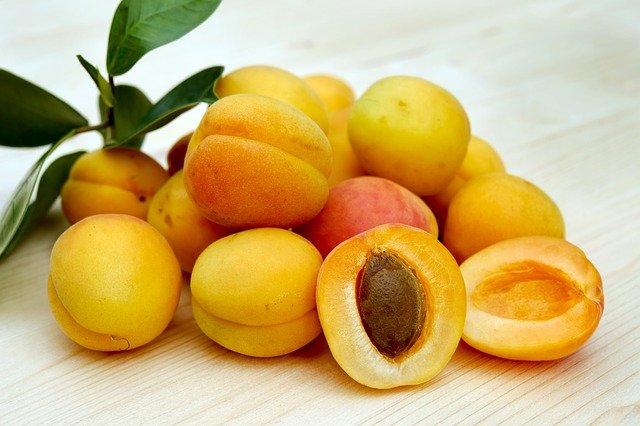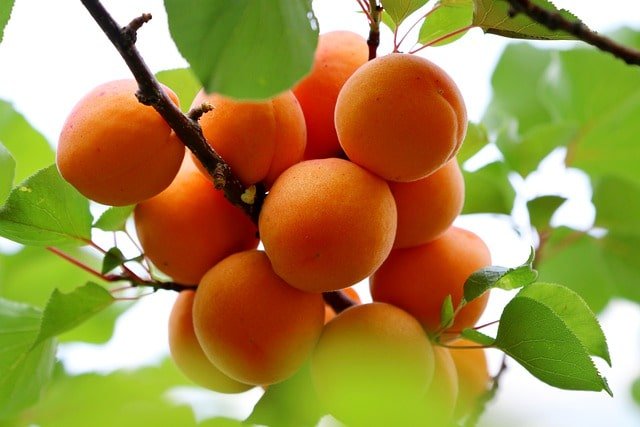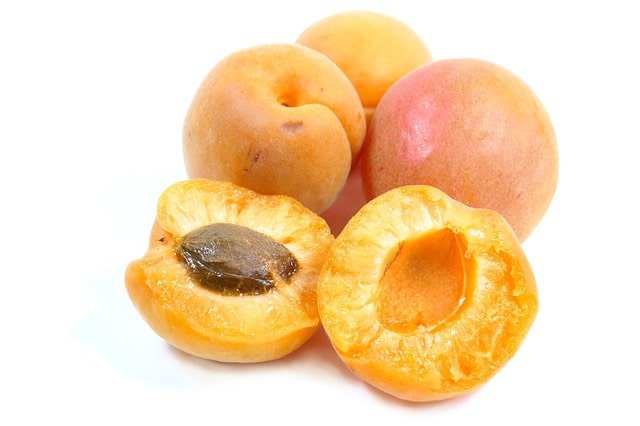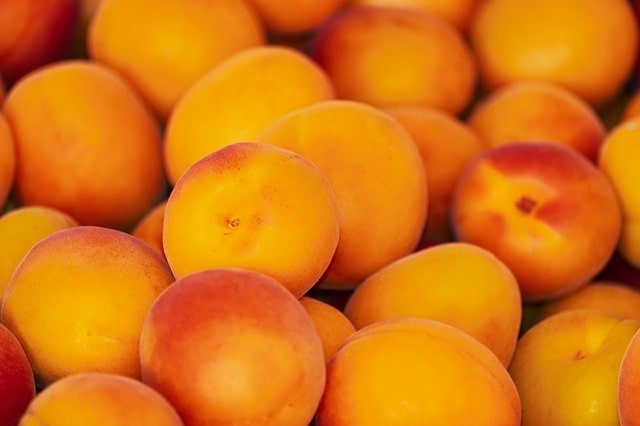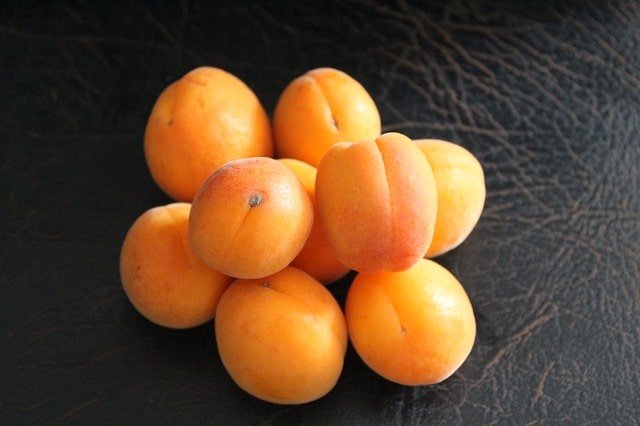What is apricot (Khubani or Khumani)?
Apricot which is also known as Khubani or Khumani, plants are small trees (with about 8–12 m in height), with 5-9 cm long leaves that are wider at the bottom and pointy at the top. Their flowers are about 2–4.5 cm in diameter.
Apricot (khubani) blossoms are white and self-pollinating. Their fruit tastes best when they are fully ripe while unripe apricots are hard and unusable.
Apricots (Prunus armeniaca) are a kind of stone fruit that is sometimes referred to as Armenian plums.
As with peaches, apricot fruits are round to rectangular (oblong) in structure and have flesh that is rich yellow to yellowish-orange in color.
Apricot (khubani) fruits that are developed can have a farinaceous feel similar to a pulp. These fruits have small hairs on their outer skin, which are consumed together with it.
Apricots contain an abundance of vitamins, minerals, and fiber, making them one of nature’s healthiest fruits. Apricots are available in a variety of forms, including stewed fruit, preserves, juices, as well as dried apricots.
‘Gun Kurusu,’ or sun-dried apricots, are what Turk’s term apricots dried naturally. The addition of sulfur to the drying procedure accelerates the drying method, making it quicker than the normal process. Apricots dried with sulfur have a prolonged shelf life.
This fruit (khubani) is native to some countries like Italy, Iran, Turkey, France, Pakistan, China, Morocco, Syria, Egypt, Greece, the USA, and Spain. Turkey is the major producer of apricots (khubani) in the world.
They are highly nutritious and provide several health benefits, including better digestion and eye health.
Apricots have a variety of therapeutic properties, including the ability to cure coughs, bleeding, asthma, eye irritation, spasms, sterility, constipation, and vaginal infections.
What is the Nutritional Value (Facts) of Apricot (Khubani) Fruit?
Nutritional value (facts) of apricot (khubani) fruit is as under:
| Nutritional Value per 100 gram of raw apricot (khubani) (1) | |
| Energy | 48 Kcal |
| Water | 86 g |
| Carbohydrates | 11 g |
| Sugars | 9 g |
| Dietary fiber | 2 g |
| Protein | 1.4 g |
| Fat | 0.4 g |
| Minerals | |
| Sodium | 1 mg |
| Calcium | 13 mg |
| Potassium | 259 mg |
| Iron | 0.4 mg |
| Magnesium | 10 mg |
| Phosphorus | 23 mg |
| Zinc | 0.2 mg |
| Manganese | 0.077 mg |
| Vitamins | |
| Vitamin A | 96 mcg |
| Vitamin B1 (Thiamine) | 0.03 mg |
| Vitamin B2 (Riboflavin) | 0.04 mg |
| Vitamin B3 (Niacin) | 0.6 mg |
| Vitamin B5 (Pantothenic acid) | 0.24 mg |
| Folate | 9 mcg |
| Vitamin C | 10 mg |
| Vitamin E | 0.89 mg |
| Vitamin K | 3.3 mcg |
What are the Uses and Health Benefits of Apricot (Khubani or Khumani)?
This fruit is very beneficial for you. 13 uses and health benefits of apricots (khubani) are as under:
1) Apricots are Highly Nutritious but Low-Calorie Fruits
Apricots are extremely nutritious, containing a wide variety of vital vitamins and minerals.
If you consume 1 fresh apricot (of about 35 g weight), it will provide you (1):
- 17 kcal of energy
- 4 grams of Carbs
- 0.135 grams of Fat
- 0.75 grams of Fiber
- 0.5 grams of Protein
- 2% of Daily Value (DV) of Potassium
- 4% of Daily Value (DV) of Vitamin A
- 4% of Daily Value (DV) of Vitamin C
- 2% of Daily Value (DV) of Vitamin E
This fruit is also a great resource of lutein, beta carotene, as well as zeaxanthin, all of these are powerful antioxidants that fight against free radicals in your body (2, 3).
It is recommended to consume apricots whole or unpeeled because its skin contains significant amounts of nutrients and fiber.
The stone in the fruit should be discarded, as it is uneatable.
2) Apricots (khubani) are Antioxidant-Rich Fruits
Apricots are an excellent resource of antioxidants like vitamin A, vitamin E, vitamin C, and beta carotene.
Additionally, they are rich in flavonoids, a class of polyphenol antioxidants that have been demonstrated to defend against diseases like heart diseases and diabetes (4, 5).
It has chlorogenic acids, catechins, and quercetin as the most important flavonoids.
These substances operate by neutralizing free radicals, which are damaging molecules for your cells and cause oxidative stress. Obesity and many chronic conditions like heart disease are associated with oxidative stress (6, 7).
3) Apricots Help to Treat Anemia
Any iron-containing plant product, including apricot, provides non-heme iron. This form of iron is slowly digested by the human body, so the longer this type of iron remains in your body, the higher your possibilities of avoiding anemia are.
Make sure you consume vitamin C with this to help your body absorb the non-heme iron effectively.
4) Apricots (Khumani) May Promote Eye Health and Improve Vision
Apricots are a good source of Vitamin A (Retinol), which helps maintain healthy eyesight.
The research demonstrates unequivocally that apricot retinol, as well as beta carotene, have a vital impact in the treatment of eye-related illnesses. It may also prevent age-related macular degeneration.
Also, apricots are rich in carotenoids and xanthophylls, which are the nutrients that researchers believe, can avoid age-related vision disorders.
5) Apricots Are a Wonderful Source of Dietary Fiber
Apricots, fresh as well as dried, are an excellent source of fiber.
Apricots can be regarded as a dietary component that contributes to the treatment of diabetes, coronary heart disease, obesity, and several forms of cancer.
6) It May Boost Bone Health
Apricots contain a good amount of calcium, which is important for bone health and development.
Also, this fruit is rich in potassium, which is essential for the proper absorption and uniform distribution of calcium.
Studies have also shown that apricots can reverse bone loss and alter bone metabolism in postmenopausal osteoporosis women (14).
7) It May Aid Weight Loss and Metabolism
When you eat apricots, due to their fiber content, they can keep you full for long periods, and thus contributes to a healthy weight loss.
It may also speed up your metabolism and hence cause weight loss.
8) Apricots (Khubani) May Prevent Liver Damage
According to studies, apricots can ease the symptoms of fatty liver disease and protect against liver damage (15).
Also, organic apricots (sun-dried organic apricot/SDOA) were found to be effective in promoting liver regeneration in rats (16).
9) Apricots May Treat Respiratory Ailments
Many studies have shown an inverse relationship between flavonoids and asthmatic symptoms. Apricots being rich in flavonoids are helpful in treating asthma.
Also, vitamin E and other antioxidants present in apricots fight free radicals; and hence boost your immunity. In this way, apricots prevent issues like cold and flu.
10) Apricots May Promote Skin Health
Wrinkles or skin problems are mostly caused by environmental factors like pollutants, sun, or cigarette smoke.
Additionally, evidence reveals a clear relationship between UV light, sunburns, and the chance of developing melanoma, a particularly fatal type of skin cancer (8).
Notably, you may combat most of these skin issues by eating a healthy, antioxidant-rich diet, which apricots supply.
Apricots are high in fat-soluble as well as water-soluble vitamins, including vitamin A, vitamin C. Consuming such phytonutrient-dense apricots may help preserve amazing skin. Vitamin C protects the skin from ultraviolet damage as well as environmental contaminants by neutralizing free radicals.
Additionally, Vitamin C contributes to the formation of collagen, which gives your skin its strength as well as flexibility. The more this vitamin you intake, the better your skin will be able to heal from sun damage and avoid wrinkles (9).
Vitamins are necessary for keeping healthy skin.
Apricots also contain a lot of water which helps to keep your body cells hydrated and hence soothes the skin.
Another apricot component, beta carotene, will help to prevent sunburns. In ten-week research, beta carotene supplementation decreased the incidence of sunburn by 20% (10).
Using sunscreen is always recommended, but snacking on apricots can provide you extra protection.
11) Apricots (Khubani) Can Promote Your Gut Health
165 grams (or 1 cup) of chopped apricots has 3.3 grams of fiber, which is 8.6 percent of the daily value (DV) for males and 13.2 percent for women (1).
As we have discussed above, apricots are a good source of fibers, soluble as well as insoluble. The soluble type of fiber can be dissolved in water and contains gums, pectin, as well as polysaccharides, whereas the insoluble type of fiber cannot be dissolved in water and contains hemicellulose, cellulose as well as lignin (11).
Apricots contain a high concentration of soluble fiber, which is necessary for regulating blood sugar as well as cholesterol levels (12).
Additionally, fiber slows the flow of food via the digestive path and nourishes beneficial gut microorganisms. A healthy gut microbiome has been associated with a decreased risk of obesity (13).
While one apricot contains only 0.75 g of fiber, it’s simple to consume several in 1 sitting.
12) Apricots May Promote Cardiovascular Health
Apricots contain a good deal of potassium. Additionally, potassium is necessary for the proper functionality of your heart. It is said that patients with cardiac issues should include apricots in their normal diet.
Regular consumption of this fruit may help to conserve electrolyte balance and blood pressure due to its potassium. Additionally, it can aid in maintaining a strong heart and avoiding heart attacks.
13) It is Simple to Consume
Apricots, fresh as well as dried, provide a fast and tasty snack or indeed a delicious addition to your favorite dish. Numerous methods exist for incorporating them into your diet.
- Apricots can be eaten raw as breakfast
- It can be thinly cut and put in yogurt as well as salad
- It can be Cooked in a slower cooker with chicken and beef
- Apricots can be included in Jams as well as salsas
- Incorporated into delicacies such as cakes, pies, as well as pastries
- Apricots may substitute peaches and plums within many dishes due to their sweetness and tartness.
What are the Side Effects of Apricot (Khubani)?
Apricots have numerous benefits, but still, it has some side effects.
Below here I have listed 6 side effects of apricots (khubani):
1) Apricots should be consumed in low quantities; excessive apricot consumption might result in sweating, fainting, vomiting, giddiness, including loss of consciousness.
2) The excessive consumption of this fruit’s seed is toxic; its absorption changes into cyanide. This may be damaging to your body.
3) Individuals with known sulfur sensitivity should take extra caution while eating apricots.
4) Unripe apricots (khubani) may also upset your stomach.
5) There really are no obvious concerns caused by eating apricots, except for those who suffer from common allergies.
6) Usually dried apricots contain sulfites. Sulfites can have a significant effect on asthma and may cause asthmatic attacks.
Conclusion
Apricots (khubani) are high in organic antioxidants, which help protect the body from the sun as well as pollutants. These, fresh as well as dried, are readily accessible in stores.
Apricots assist the body in hydrating because of their significant water content, which is necessary for regulating a normal heart rate as well as blood pressure.
These are indeed tasty fruits that are a good source of vitamins, fiber, as well as antioxidants.
They provide several benefits, including better skin, eye, and even gut health. It doesn’t matter what you’re taking, fresh apricots, as well as dried ones, are a really simple addition to snacks, salads, even main meals.
————————————————-
References:
1) USDA Food Data Central
https://fdc.nal.usda.gov/index.html
2) Lutein, zeaxanthin, and meso-zeaxanthin: The basic and clinical science underlying carotenoid-based nutritional interventions against ocular disease
https://pubmed.ncbi.nlm.nih.gov/26541886/
3) Carotenoids: potential allies of cardiovascular health?
https://pubmed.ncbi.nlm.nih.gov/25660385/
4) Polyphenols and Glycemic Control
https://pubmed.ncbi.nlm.nih.gov/26742071/
5) Molecular mechanisms of the cardiovascular protective effects of polyphenols
https://pubmed.ncbi.nlm.nih.gov/22935143/
6) Oxidative Stress in Obesity: A Critical Component in Human Diseases
https://www.ncbi.nlm.nih.gov/pmc/articles/PMC4307252/
7) CVD and Oxidative Stress
https://pubmed.ncbi.nlm.nih.gov/28230726/
8) History of Severe Sunburn and Risk of Skin Cancer Among Women and Men in 2 Prospective Cohort Studies
https://pubmed.ncbi.nlm.nih.gov/27045074/
9) The Roles of Vitamin C in Skin Health
https://www.ncbi.nlm.nih.gov/pmc/articles/PMC5579659/
10) Protection from sunburn with beta-Carotene–a meta-analysis
https://pubmed.ncbi.nlm.nih.gov/18086246/
11) The health benefits of dietary fiber: beyond the usual suspects of type 2 diabetes mellitus, cardiovascular disease, and colon cancer
https://pubmed.ncbi.nlm.nih.gov/22401879/
12) The health benefits of dietary fiber: beyond the usual suspects of type 2 diabetes mellitus, cardiovascular disease, and colon cancer
https://pubmed.ncbi.nlm.nih.gov/22401879/
13) Diabetes, obesity, and gut microbiota
https://pubmed.ncbi.nlm.nih.gov/23768554/
14) Dried Plum’s Unique Capacity to Reverse Bone Loss and Alter Bone Metabolism in Postmenopausal Osteoporosis Model
https://www.ncbi.nlm.nih.gov/pmc/articles/PMC3612052/
15) Protective effect of apricot (Prunus armeniaca L.) on hepatic steatosis and damage induced by carbon tetrachloride in Wistar rats
https://pubmed.ncbi.nlm.nih.gov/19822030/
16) Effects of organic apricot on liver regeneration after partial hepatectomy in rats
https://pubmed.ncbi.nlm.nih.gov/23953562/
————————————————-
Disclaimer: This article is intended for informational purposes only. Any information associated with this article should not be considered as a substitute for prescriptions suggested by local health care professionals.
————————————————-
Recommended Articles:
1) Kiwi Fruit: Uses, Health Benefits, Calories & Side Effects
2) Bananas: Calories, Nutrition Facts, & Health Benefits
3) Pineapple: Uses, Health Benefits, Types, & Nutrition
————————————————-
